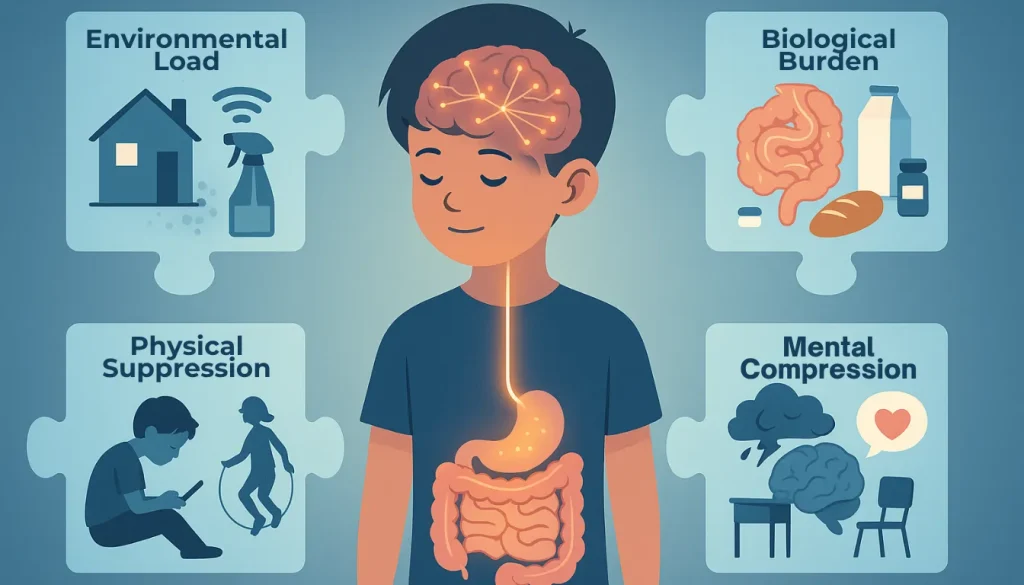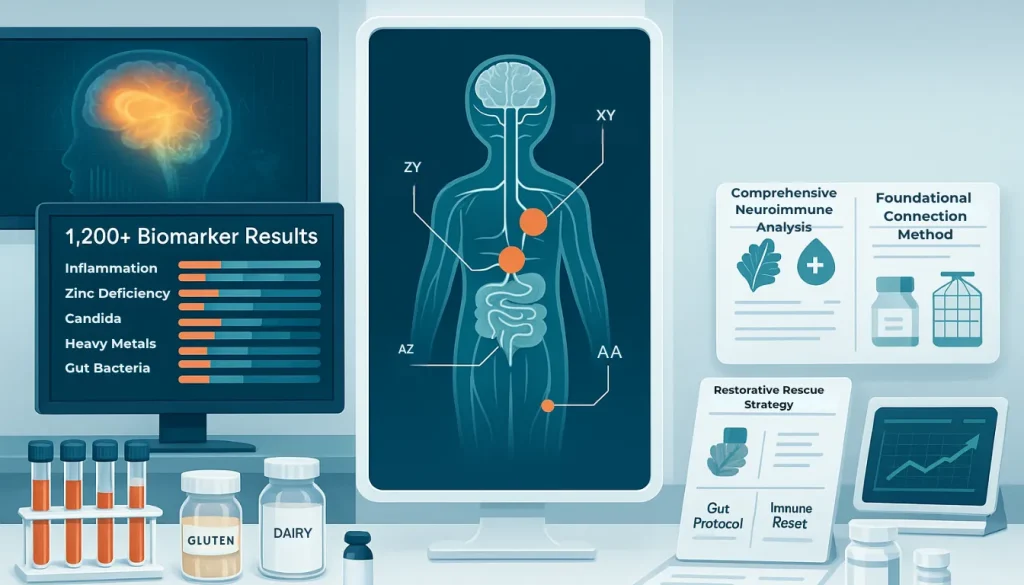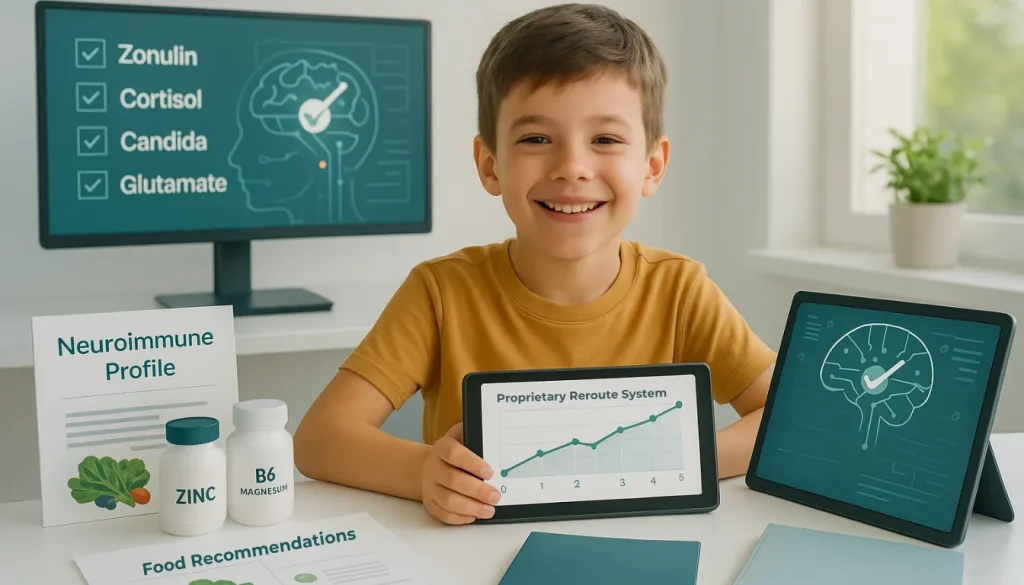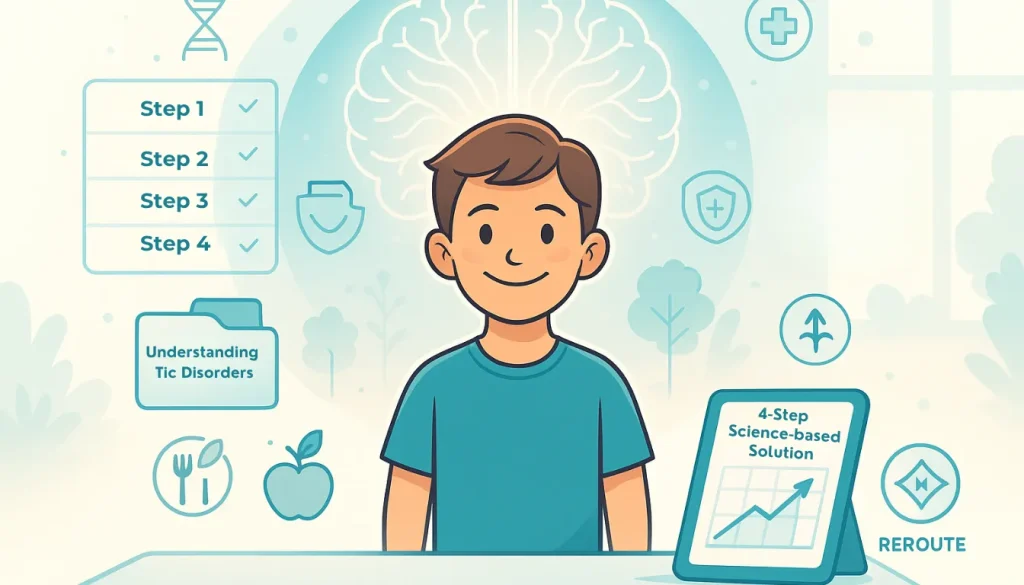Watch a child with tics navigate their day, and you’ll witness something remarkable—their brain constantly adapting and finding new pathways around neurological roadblocks. While traditional medicine often focuses on suppressing tics through medication, there’s a growing understanding that we can help rewire the neural circuits that drive these involuntary movements and sounds.
Your child’s developing brain possesses an incredible ability called neuroplasticity, which means it’s constantly forming new connections and strengthening existing ones. This natural flexibility opens up possibilities beyond what many parents realize when they’re first exploring a tic disorder recognition. Instead of simply managing signs, you can actively participate in helping your child’s brain create healthier patterns.
The concept of “rerouting” tic disorders isn’t about quick fixes or benefit supports—it’s about understanding how targeted interventions, from dietary changes to mindfulness practices, can influence the neural networks involved in tic expression. When you combine evidence-based natural approaches with your child’s innate neuroplasticity, you’re not just hoping for improvement; you’re actively supporting your child’s brain in developing more balanced pathways.
Key Takeaways
-
Neuroplasticity offers hope beyond traditional approaches: Children’s developing brains can rewire neural circuits that drive tics, moving beyond simply suppressing symptoms to creating healthier brain pathways through targeted interventions.
-
Immune system dysregulation is often the hidden culprit: Many tic disorders stem from a dysregulated immune system creating inflammation that affects the brain, rather than mysterious brain malfunctions—a connection traditional medicine frequently overlooks.
-
Our 4-D Framework addresses root causes: Effective tic management requires examining environmental load (mold, chemicals, EMFs), biological burden (gut health, food sensitivities), physical suppression (movement, posture), and mental compression (stress, anxiety) as interconnected factors.
-
Comprehensive testing reveals the whole picture: Advanced biomarker analysis examining 1,200+ markers can uncover specific triggers like food sensitivities, heavy metal toxicity, and infections that standard medical testing typically misses.
-
Strategic intervention outperforms trial-and-error approaches: Collaborating with knowledgeable practitioners who understand the neuroimmune connection offers personalized roadmaps for improvement, eliminating costly and time-consuming guesswork that can delay your child’s progress.
-
Real transformation takes time but delivers lasting results: Success stories like Sarah’s son progressing from classroom dysfunction to Eagle Scout demonstrate that addressing underlying causes through strategic rerouting can lead to thriving, not just managing symptoms.
Table of Contents
Breaking the Mold: Why Traditional Approaches to Tic Disorders Fail
Traditional medicine’s approach to treating Tourette’s often leaves families feeling stranded at a dead end. When conventional routes don’t work, it’s time to explore detours that can lead to meaningful solutions.
The One-Route Mentality in Medicine
Picture this: you’re sitting in your pediatrician’s office, finally getting answers about your child’s mysterious eye blinking or throat clearing. Your heart races as you wait for guidance, hope, maybe even a roadmap forward.
Instead, you hear the words that echo through countless exam rooms across the country: “Just ignore it. Maybe they’ll grow out of it.“
That’s it? After weeks of worry and observation, after your child is embarrassed at school, after sleepless nights wondering what’s wrong, the medical establishment’s best advice is to pretend nothing’s happening?
This one-route mentality reflects a fundamental flaw in how traditional medicine approaches tic disorders. Rather than investigating underlying triggers or exploring comprehensive solutions, the standard protocol amounts to wishful thinking wrapped in medical authority.
Studies show that tic disorders affect around 1% of children, yet the “wait and see“ approach leaves families feeling helpless and isolated. You’re not imagining the frustration—you’re experiencing the limitations of a system that views tics as something to endure rather than understand.
The problem runs deeper than individual doctors. Medical training typically focuses on indicator suppression rather than root cause exploration. When the only tool you have is a hammer, everything looks like a nail—and in this case, the “hammer” is often dismissive reassurance. Here’s a breakdown of medical vs natural treatments.
The Flooded Highway Analogy: Why You Need a Detour
Imagine you’re driving to an important destination when suddenly you hit a wall of orange construction cones. The main highway is completely flooded out—there’s no way through.
What do you do? Sit in your car and hope the water recedes? Turn around and go home? Of course not. You pull out your GPS and find an alternate route.
That’s what happens when traditional approaches to tic disorders fail. Conventional medicine is typically hindered by limitations, leaving families without viable options. But here’s the thing—there are always detours if you know where to look.
When a neurologist advises “just monitoring” your child’s worsening tics, it can feel like hitting a dead end. Traditional treatments often come with side effects or advice to “wait it out,“ leaving families searching for alternatives.
One parent found success by addressing food sensitivities, reducing inflammation, and collaborating with experts on the gut-brain connection. Her son’s tics improved significantly when they tackled the bigger picture. Research indicates that tic disorders are influenced by a combination of factors, including the immune system, neurochemistry, environment, and nutrition. A single-track medical approach often falls short in addressing these complexities.
Here’s what nobody tells you: when conventional routes fail, it doesn’t mean your child is hopeless or untreatable. It means you need better navigation tools and practitioners willing to explore uncharted territory.
Your GPS might show one blocked highway, but it also reveals dozens of side roads, scenic routes, and alternative paths that can get you where you need to go, sometimes even faster than the original route would have.

Understanding Tic Disorders: More Than Just Tics
When your child’s body starts moving or making sounds they can’t control, it’s natural to feel overwhelmed. But here’s what most parents don’t realize—tic disorders are far more complex than the visible signs you’re witnessing.
The Missing Link: Immune System Dysregulation
The real cause of many tic disorders isn’t a brain issue but a dysregulated immune system. When the immune system is overactive, it can trigger inflammation that affects the brain and contributes to the development of tics. However, this connection is rarely discussed in traditional medical settings.
When a child’s immune system is out of balance, it can cause inflammation that triggers tics, impacts behavior, and disrupts focus, like a faulty smoke alarm going off without cause. This immune dysfunction often begins in the gut and may be triggered by infections, food sensitivities, toxins, or stress. Unfortunately, traditional medicine often overlooks this link, focusing on managing symptoms rather than addressing the underlying cause. Understanding that tics could be a sign of immune system distress changes the perspective entirely.
The 4-Dimensional Framework to Rerouting Tic Disorders
When you’re looking at tic disorders, you need to examine four critical areas that work together like a puzzle. Think of it as detective work—you’re searching for clues across your child’s environment, biology, physical state, and mental wellbeing.
Environmental Load
Your child’s surroundings have a greater impact than you might realize. That “safe” home environment could be triggering those tics in ways you’d never suspect.
Mold lurking in basement corners can send your child’s immune system into overdrive. One family discovered black mold behind their washing machine—within weeks of remediation, their daughter’s facial tics decreased by 70%.
Chemical overload hits harder than you think. Those air fresheners, cleaning products, and even that new carpet smell? They’re potential tic triggers. Your child’s developing nervous system processes these toxins differently from yours.
Electromagnetic fields from WiFi routers, tablets, and smartphones create invisible stress. Try moving electronic devices out of your child’s bedroom for two weeks. You might be surprised by the improvement.
Seasonal allergens don’t just cause sneezing—they can also trigger tics. Spring pollen counts often correlate with increased tic frequency in children who are sensitive to pollen.
Here’s what works: Start with a 48-hour “environmental refresh.“ Remove air fresheners, switch to natural cleaning products, and create a low-EMF bedroom space. Document any changes in tic patterns.
Biological Burden
Your child’s gut might be staging a revolt—and those tics could be the battle cry.
Leaky gut syndrome sounds scary because it is. When your child’s intestinal wall becomes permeable, food particles escape into the bloodstream, triggering immune responses that can manifest as tics.
Food sensitivities aren’t always obvious. That daily glass of milk or lunchtime sandwich might be slowly ramping up inflammation. One mom tracked her son’s tics for three weeks and discovered they spiked every time he ate gluten.
Bacterial overgrowth in the small intestine creates its toxins—endotoxins that your child’s liver struggles to process. These internal toxins can trigger the same immune response as external ones.
Nutritional deficiencies initially affect the nervous system. Magnesium, B vitamins, and omega-3s aren’t just “nice to have“—they’re essential for proper nerve function.
The game-changer? An elimination diet focusing on the most common triggers: gluten, dairy, food dyes, and sugar. Yes, it’s challenging, but many families see tic reduction within 2-3 weeks.
Physical Suppression
Your child’s body needs movement like a car needs oil—without it, everything starts breaking down.
A sedentary lifestyle creates physical stress that manifests as tics. When your child spends hours hunched over devices, their nervous system becomes overstimulated, triggering a state of “stress mode.“
Poor posture resulting from constant screen time can compress nerves and restrict blood flow to the brain. That forward head position? It’s putting extra pressure on your child’s cervical spine.
Lack of deep breathing keeps the nervous system revved up. Shallow chest breathing signals danger to the brain, maintaining a state of constant alertness.
Sleep disruption from exposure to blue light and physical inactivity creates a vicious cycle. Poor sleep exacerbates tics, which in turn make sleep even more elusive.
Movement therapy works wonders. Swimming, martial arts, or even daily walks can reset your child’s nervous system. One family started with 15-minute evening walks—their son’s bedtime tics decreased within days.
Try this: Carry out a “movement snack” every hour during screen time. Thirty seconds of jumping jacks or stretching can interrupt the stress buildup.
Mental Compression
Your child’s emotional world might be a pressure cooker ready to explode—and tics could be the steam valve.
School bullying creates chronic stress that your child might not even mention. That constant hypervigilance can exhaust the nervous system and trigger tics.
Academic pressure from perfectionist expectations keeps stress hormones elevated. Your straight-A student might be paying the price with increased tics.
Family tension affects children more than adults realize. Even “quiet” arguments or financial stress create an atmosphere of unease that sensitive children absorb.
Social anxiety surrounding tics creates a feedback loop—the fear of tics in public exacerbates the tics themselves.
Emotional suppression teaches children to stuff down feelings, but that energy has to go somewhere. Often, it shows up as physical tics.
Teaching your child that tics don’t define them. When one 10-year-old learned to say “My brain just hiccuped,“ instead of feeling ashamed, his tics decreased and his confidence soared.
Stress-busting techniques that work Include Progressive muscle relaxation before bed, mindfulness apps designed for kids, and creating a “worry time” where your child can express concerns for 10 minutes each day.
Remember—this framework isn’t about finding one magic solution. It’s about identifying which of these triggers are affecting your child most and creating a personalized rerouting plan that addresses their unique triggers.

The Proprietary Reroute System (Backed by Real Results)
When conventional approaches failed to deliver meaningful solutions, a breakthrough three-step system emerged that addresses tic disorders from the ground up. This proprietary process transforms how families approach natural tic management through comprehensive analysis and targeted intervention.
Step 1: Comprehensive Neuroimmune Analysis
Comprehensive neuroimmune analysis examines over 1,200 biomarkers to uncover the hidden triggers behind your child’s tics. Think of it as creating a detailed map of your child’s internal world—revealing inflammation patterns, nutrient deficiencies, immune dysfunction, and metabolic imbalances that traditional testing often misses.
This extensive testing goes far beyond basic blood work. You’ll discover specific food sensitivities that might be triggering neuroinflammation, identify heavy metal toxicity levels that could be disrupting neurotransmitter function, and pinpoint infections that may be driving autoimmune responses.
Most doctors run 20-30 basic markers and call it comprehensive. But tic disorders require detective work that digs deeper into the immune-brain connection. This analysis reveals why your child’s nervous system is misfiring and provides the roadmap for targeted improvement.
The testing phase typically takes 2-3 weeks to complete all collections, but the insights you’ll gain are invaluable. Parents often say this is the first time they’ve gotten real answers about what’s happening inside their child’s body.
Step 2: Foundational Connection Method
The foundational connection method links your child’s test results directly to their specific tic signs and behavioral patterns. This isn’t about generic protocols—it’s about connecting the dots between that elevated inflammatory marker and your child’s throat clearing, or understanding why that particular nutrient deficiency correlates with their eye blinking episodes.
During this phase, you’ll see the clear connections between biological dysfunction and observable signs. Maybe your child’s vocal tics spike every time they eat gluten because their zonulin levels are through the roof. Or perhaps their motor tics worsen during stressful periods because their cortisol patterns are completely dysregulated.
The magic happens when you can finally explain the “why” behind your child’s tics. Instead of feeling helpless watching seemingly random signs, you’ll understand the biological mechanisms driving each movement and sound. This knowledge transforms your entire approach from reactive to proactive.
Many families describe this step as their lightbulb moment. Suddenly, all those puzzling patterns start making perfect sense, and you can see exactly which systems need support to create lasting change.
Step 3: Restorative Rescue Strategy
A restorative rescue strategy involves creating personalized short-term and long-term action plans designed to reduce your child’s tic symptoms naturally. You’ll receive specific protocols targeting the root causes identified in your analysis, complete with timelines and measurable goals.
Your short-term strategies might include immediate dietary modifications to reduce inflammation, targeted supplements to address critical deficiencies, and environmental changes to minimize toxic load. These interventions often produce noticeable improvements within two to four weeks.
Long-term goals focus on rebuilding your child’s foundational health systems. This includes gut improvement protocols, immune system rebalancing, and nervous system support strategies that create lasting resilience against tic triggers.
The beauty of this approach lies in its precision. Instead of trying random supplements or elimination diets, you’re implementing targeted interventions based on your child’s unique biochemistry. Parents consistently report feeling empowered and hopeful for the first time in months or years.
Every strategy is accompanied by clear implementation guidelines, expected timelines, and monitoring protocols, enabling you to track progress and make adjustments as needed. You’re not exploring this journey alone—you have a detailed roadmap to guide you to success.

Stop Guessing: Why You Need to Reroute Strategically
The trial-and-error approach to tics isn’t just frustrating—it’s expensive and potentially harmful. When your child’s well-being hangs in the balance, you can’t afford to throw random solutions at the wall hoping something sticks.
DIY Doesn’t Cut It
You’ve probably been there. Standing in the supplement aisle, I wonder if magnesium might help. Or perhaps B6. Maybe zinc? The internet’s full of parent forums where well-meaning families share what “worked for them“—but here’s the thing: what works for one child with tics might be entirely wrong for yours.
Your child isn’t a science experiment.
When families try the DIY route, they often end up cycling through supplements, dietary changes, and lifestyle modifications without any fundamental understanding of why they’re making these changes. It’s like trying to fix a car engine by randomly replacing parts—you might get lucky, but you’re more likely to create new problems.
The reality? Tic disorders affect around 1% of children, and each case involves a complex web of biological, environmental, and neurological factors. Without proper testing and analysis, you’re essentially guessing at solutions while your child continues to struggle.
Think about it this way: if your child had diabetes, would you guess at insulin dosages? Of course not. Yet somehow, when it comes to tic disorders, families are expected to navigate this maze alone.
The hidden cost of guessing games runs deeper than your wallet.
Every month spent trying random remedies is another month your child’s nervous system remains dysregulated. It’s another month of social challenges, academic struggles, and family stress. The time you can’t get back.
Partnering for the Reroute
Here’s what changes everything: working with someone who understands how to connect the dots between your child’s unique biomarkers, environmental triggers, and tic patterns.
This isn’t about finding another doctor who’ll recommend – and send you on your way.
Genuine partnership means having someone in your corner who sees the bigger picture. Someone who looks at your child’s comprehensive neuroimmune profile—all 1,200+ biomarkers—and says, “Ah, this is why your child’s tics flare up after eating certain foods,“ or “Here’s the environmental trigger that’s been hiding in plain sight.“
When you work with the right specialist, you’re not just getting test results thrown at you. You’re getting translation. Context. A roadmap that makes sense of your child’s unique biology.
Partnership means you’re never exploring this alone.
Your provider supports you as an advocate, educator, and strategist, helping you navigate test results, interpret your child’s responses, and stay on track. This partnership shifts you from feeling lost to feeling empowered, enabling you to understand interventions, recognize warning signs, and take proactive steps to manage tics.
The difference is night and day.
Families often spend years and significant money searching for answers about tic disorders. Partnering with experts who understand the neuroimmune connection provides a knowledgeable, science-based approach. This method addresses a child’s specific needs, helping their brain reroute effectively.
Resources to Reroute Tic Disorders (With Precision)
Finding the right diagnostic tools feels like having a GPS instead of wandering through a maze blindfolded. These precision tests cut through the guesswork that’s been frustrating your family for months.
Key Tests
|
Test Name |
What It Reveals |
Why It Matters for Your Child |
|---|---|---|
|
GI-MAP |
Gut pathogens + leaky gut markers |
Detects candida, parasites, and bacterial overgrowth that might be triggering your child’s tics through the gut-brain connection |
|
Mycotoxin Panel |
Hidden mold exposure |
Uncovers environmental or food-borne mold toxins that can cross the blood-brain barrier and intensify tic signs |
|
OAT (Organic Acids Test) |
Neurotransmitter precursors + cellular energy |
Shows mitochondrial dysfunction and whether your child’s brain has the fuel it needs to regulate tic impulses |
|
DUTCH Test |
Complete hormonal overview |
Reveals stress hormone patterns and endocrine disruptions that can amplify tic frequency during growth spurts |
|
Professional Coaching + Interpretation |
Personalized action roadmap |
Prevents the expensive headache of misreading complex lab results and creates a step-by-step plan tailored to your child’s unique biomarkers |
Functional Lab Testing serves as an investigative tool designed to uncover the biological factors underlying your child’s tic disorders.
Pro tip: Don’t attempt to interpret these results alone. The numbers can resemble hieroglyphics, and a single misread marker can lead you down the wrong assistance path for months.
That’s where finding a tic disorder specialist becomes your child’s lifesaver – turning overwhelming data into a clear, actionable plan that works for your child’s unique biology.
Final Word: The Real Cost of Staying on the Wrong Route
When you remain stuck in conventional approaches that only suppress signs, your child’s potential stays locked away. Every day you wait means another opportunity for their developing brain to form healthier patterns slips by.
The science is precise: neuroplasticity works best during childhood when the brain’s adaptability is at its peak. Your child’s immune system is trying to communicate through their tics, and ignoring this message only prolongs their struggle.
You have the power to choose a different path—one that honors your child’s unique biology and addresses the root causes rather than masking the signs. The tools exist, the knowledge is available, and your child’s future is waiting for you to take action.
The question isn’t whether rerouting is possible—it’s whether you’re ready to give your child the science-based approach they deserve.
Frequently Asked Questions
Neuroplasticity is the brain’s ability to form new neural connections and adapt throughout life. For children with tics, this means their brains can develop healthier patterns through targeted interventions, such as dietary changes and mindfulness practices, rather than just suppressing symptoms.
Tic disorders often stem from a dysregulated immune system rather than just brain malfunction. Inflammation triggered by factors like infections, food sensitivities, gut issues, and stress can cause the involuntary movements and sounds characteristic of tics.
The 4-Dimensional Framework examines four critical areas: environmental load (mold, chemicals, and electromagnetic fields), biological burden (gut health and food sensitivities), physical suppression (movement and posture), and mental compression (emotional stress and bullying). This comprehensive approach helps identify personalized triggers.
Traditional medicine often focuses on symptom suppression and the advice to “just ignore it,“ leaving families feeling helpless. This neuroplasticity-based approach actively addresses underlying causes through dietary changes, environmental modifications, and targeted interventions to reroute tic patterns.
Specialized tests, such as GI-MAP (gut health), Mycotoxin Panel (mold exposure), OAT (neurotransmitter function), and DUTCH Test (hormonal balance), examine over 1,200 biomarkers to uncover hidden triggers that traditional testing often misses.
Yes, many tic disorders are connected to food sensitivities and gut-brain dysfunction. An elimination diet and addressing leaky gut syndrome can lead to significant improvements, as the gut-brain connection plays a crucial role in tic development.
Professional coaching helps interpret complex biomarker results and environmental triggers accurately and effectively. This prevents the frustration and potential harm associated with trial-and-error approaches, ensuring that families develop clear, actionable plans tailored to their child’s unique biology.
Results vary based on individual factors, but the approach focuses on both short-term symptom reduction and long-term neuroplasticity changes. With proper implementation of personalized strategies, families often see gradual improvements as the brain develops healthier patterns.

